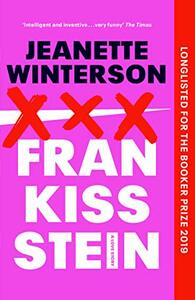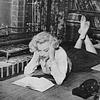Take a photo of a barcode or cover
adventurous
challenging
dark
funny
mysterious
medium-paced
Plot or Character Driven:
Plot
Strong character development:
Complicated
Loveable characters:
Yes
Diverse cast of characters:
Yes
Flaws of characters a main focus:
Yes
challenging
reflective
fast-paced
Plot or Character Driven:
Plot
Strong character development:
No
Loveable characters:
No
Diverse cast of characters:
Yes
Flaws of characters a main focus:
Yes
Sí y no. Algunas partes son geniales, otras muy pesadas. Aún así me ha gustado mucho leerlo.
Narra una perspectiva muy diferente de Victor Frankenstein y Mary Shelley en el futuro. Esa parte me ha encantado, Shelley como trans y Victor como lo que es: un ególatra de cuidado. Además me gusta lo de "comparar" a Frankenstein con los robots y la IA. Esa idea me ha gustado mucho.
Por otro lado, el pasado de Mary con las pinceladas biográficas también ha sido interesante.
La autora tiene una forma de escribir diferente sin duda. No sé si me gusta o no. Me hacía perder el hilo del libro muchas veces.
El final no me ha convencido, esperaba más.
Narra una perspectiva muy diferente de Victor Frankenstein y Mary Shelley en el futuro. Esa parte me ha encantado, Shelley como trans y Victor como lo que es: un ególatra de cuidado. Además me gusta lo de "comparar" a Frankenstein con los robots y la IA. Esa idea me ha gustado mucho.
Por otro lado, el pasado de Mary con las pinceladas biográficas también ha sido interesante.
La autora tiene una forma de escribir diferente sin duda. No sé si me gusta o no. Me hacía perder el hilo del libro muchas veces.
El final no me ha convencido, esperaba más.
a really interesting novel with some fascinating themes and neatly done splicing of historical with modern/semi sci-fi + reimagining of Frankenstein. sadly undermined by underdeveloped characters, including the one explicitly nonwhite character being a two dimensional character and the trans character being written lazily and in a way that places their transness as an unconvincing metaphor
This was sadly not for me.
I love Mary Shelley’s Frankenstein and the questions surrounding good and evil, monstrosity, the responsibility of creation, personhood, etc. it raises. The idea of retelling the genesis of this famous book while also retelling its content, in a way, in present day, relating it to AI, robots, transgender and trans-human identities, sounded intriguing. Unfortunately, while I mostly enjoyed the chapters with Mary Shelley at Lake Geneva — like the way the loss of her child and the idea of a creature that’s neither dead nor undead, but was never alive, inspired her —, I couldn’t get into Ry Shelley’s chapters in present day at all.
Both storylines are invested in philosophical questions regarding scientific progress, people vs. machines, the essence of humanity, and gender, and the characters discuss several fascinating aspects that shine an interesting light on Frankenstein and current technological advances. Unfortunately, especially in Ry’s storyline, it often felt like Winterson was more interested in discussing these questions and having her characters represent different positions than in actually telling a story, so I felt like I would’ve done better simply reading essays on the topics.
When Ry is not discussing these questions, or inexplicably pining after the scientist Victor Stein who treats him about as badly as his namesake treats the creature in Shelley’s book, Ry mostly encounters people interested in discussing his trans identity. Even though these people seem more ignorant than malicious, the casual transphobia à la“I’m not gay.” (Victor’s words shortly before hooking up with Ry) or invasive questions about his genitalia made me uncomfortable and didn’t seem to lead anywhere. (In Mary Shelley’s chapters, I found Byron’s constant misogyny equally exhausting.)
I also wasn’t sure what to think of the was Ry describes his identity himself, frequently referring to himself as (also) a woman or female. I can’t judge how real trans men would describe themselves, and I’d love to know if Winterson consulted any when writing the character of Ry. To me, it felt like she wanted to emphasise that transitioning will never fully change someone’s biology or erase their pre-transition years, which is a fact that no one denies, but also seems like an odd thing to focus on this much when writing a trans protagonist.
While Ry is often funny, with a rather dry humour, it didn’t help that his style of narrating is very distant and aloof, making it hard to connect with him emotionally, or even to understand what he’s feeling. Even almost halfway through the novel, I felt myself still utterly uninterested in his story, so I decided to let it go.
Maybe audio wasn't the right format to approach this book because it’s easier for me to get distracted which isn’t helpful in the often dense dialogue. I do, however, also have a paper copy, and considering that large chunks of Ry’s chapters consist of dialogue with no quotation marks and little narration to mark the speakers — a style I personally strongly dislike—, I believe the well-read audio actually makes it easier to follow these conversations. Either way though, there was simply too much dialogue on too little story to keep me invested.
I love Mary Shelley’s Frankenstein and the questions surrounding good and evil, monstrosity, the responsibility of creation, personhood, etc. it raises. The idea of retelling the genesis of this famous book while also retelling its content, in a way, in present day, relating it to AI, robots, transgender and trans-human identities, sounded intriguing. Unfortunately, while I mostly enjoyed the chapters with Mary Shelley at Lake Geneva — like the way the loss of her child and the idea of a creature that’s neither dead nor undead, but was never alive, inspired her —, I couldn’t get into Ry Shelley’s chapters in present day at all.
Both storylines are invested in philosophical questions regarding scientific progress, people vs. machines, the essence of humanity, and gender, and the characters discuss several fascinating aspects that shine an interesting light on Frankenstein and current technological advances. Unfortunately, especially in Ry’s storyline, it often felt like Winterson was more interested in discussing these questions and having her characters represent different positions than in actually telling a story, so I felt like I would’ve done better simply reading essays on the topics.
When Ry is not discussing these questions, or inexplicably pining after the scientist Victor Stein who treats him about as badly as his namesake treats the creature in Shelley’s book, Ry mostly encounters people interested in discussing his trans identity. Even though these people seem more ignorant than malicious, the casual transphobia à la
I also wasn’t sure what to think of the was Ry describes his identity himself, frequently referring to himself as (also) a woman or female. I can’t judge how real trans men would describe themselves, and I’d love to know if Winterson consulted any when writing the character of Ry. To me, it felt like she wanted to emphasise that transitioning will never fully change someone’s biology or erase their pre-transition years, which is a fact that no one denies, but also seems like an odd thing to focus on this much when writing a trans protagonist.
While Ry is often funny, with a rather dry humour, it didn’t help that his style of narrating is very distant and aloof, making it hard to connect with him emotionally, or even to understand what he’s feeling. Even almost halfway through the novel, I felt myself still utterly uninterested in his story, so I decided to let it go.
Maybe audio wasn't the right format to approach this book because it’s easier for me to get distracted which isn’t helpful in the often dense dialogue. I do, however, also have a paper copy, and considering that large chunks of Ry’s chapters consist of dialogue with no quotation marks and little narration to mark the speakers — a style I personally strongly dislike—, I believe the well-read audio actually makes it easier to follow these conversations. Either way though, there was simply too much dialogue on too little story to keep me invested.
Graphic: Misogyny, Transphobia
adventurous
dark
inspiring
mysterious
fast-paced
Plot or Character Driven:
Character
Strong character development:
Yes
Loveable characters:
Complicated
Diverse cast of characters:
Yes
Flaws of characters a main focus:
Complicated
After not adoring Oranges Are Not The Only Fruit, I’m glad I can say that I loved this. Winterson blends the imagined life if Mary Shelley with an FTM counterpart, in love with Frankenstein.
This novel has been the first fictional depiction of transmale sexuality that I’ve ever read. Not just that I loved, but that I’ve been exposed to at all. Our community is rarely given depiction at all, and so for it to be just as complex and flawed and strange and hot as it is with cis love stories, I was overjoyed. Ry’s relationship with Victor was the main draw for me, and I really enjoyed it as a backdrop to the philosophical conversations throughout.
As for descriptions of the Shelleys, I liked so much of the gender reflections and feelings on grief that mirror Victor’s desire for ever lasting life. It’s the perfect structure with which to discuss AI: framing it in an era where it seems impossible allows it to appear as ridiculous and unnecessary as it truly is.
Parallels between Ry and the Creature were great too - this vexation and injustice a person can have about their form. The betrayal of the body is a significant trans feeling, and the Creature has someone real to blame. Ry uses his agency as a human to design his body in a way that allows him to own again. He is afforded the privilege of congruence that the Creature could never have.
Ron Lord’s sexbots I found to be an overt and unforgiving representation of female commodification, mirroring the forced domesticity and misogynistic ignorance spoken by Lord Byron in the Shelley chapters. I found Ron’s segments to be almost satirically, awfully funny because of how base they were. His persistent misgendering of Ry also added to his overall dickishness.
I thoroughly loved a lot of this and I read it very quickly. I think on a revisit I’d like to read it even closer and maybe it could read five star status.
This novel has been the first fictional depiction of transmale sexuality that I’ve ever read. Not just that I loved, but that I’ve been exposed to at all. Our community is rarely given depiction at all, and so for it to be just as complex and flawed and strange and hot as it is with cis love stories, I was overjoyed. Ry’s relationship with Victor was the main draw for me, and I really enjoyed it as a backdrop to the philosophical conversations throughout.
As for descriptions of the Shelleys, I liked so much of the gender reflections and feelings on grief that mirror Victor’s desire for ever lasting life. It’s the perfect structure with which to discuss AI: framing it in an era where it seems impossible allows it to appear as ridiculous and unnecessary as it truly is.
Parallels between Ry and the Creature were great too - this vexation and injustice a person can have about their form. The betrayal of the body is a significant trans feeling, and the Creature has someone real to blame. Ry uses his agency as a human to design his body in a way that allows him to own again. He is afforded the privilege of congruence that the Creature could never have.
Ron Lord’s sexbots I found to be an overt and unforgiving representation of female commodification, mirroring the forced domesticity and misogynistic ignorance spoken by Lord Byron in the Shelley chapters. I found Ron’s segments to be almost satirically, awfully funny because of how base they were. His persistent misgendering of Ry also added to his overall dickishness.
I thoroughly loved a lot of this and I read it very quickly. I think on a revisit I’d like to read it even closer and maybe it could read five star status.
4.5 stars. Video review https://www.youtube.com/watch?v=asizdWPtukA&feature=youtu.be
This is clever, funny, satirical and thought provoking. It's set in two different time periods - the back story of Mary Shelley who wrote the famous book Frankistein and present day where Ry is a transgender doctor who is in love with Victor, a professor who is leading the public debate around AI and cryogenics. Both time periods cover ethics and scientific progress and what it means to be human. I loved it and thought the character Ron Lord was an absolute hoot!
2.5*
hmmmm. parts of this were very good, parts of this were very bad. i'm not the right person to speak on the bad parts, but they're there and shouldn't be. the stars i'm rating this are entirely for the beautiful language that was (sometimes) present; everything else is... why did jeanette winterson think she was the correct person to write on these things, through the people she did, and to write them as she did? hmmm.
hmmmm. parts of this were very good, parts of this were very bad. i'm not the right person to speak on the bad parts, but they're there and shouldn't be. the stars i'm rating this are entirely for the beautiful language that was (sometimes) present; everything else is... why did jeanette winterson think she was the correct person to write on these things, through the people she did, and to write them as she did? hmmm.





